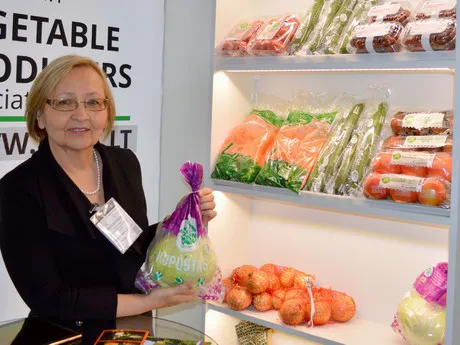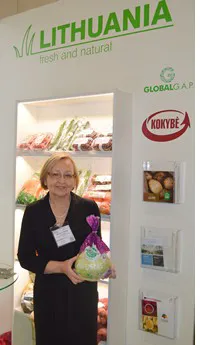Although the entry into the EU in 2004 was seen by many growers as a threat – the cheap import fruit and vegetables would finish off the growers – the sector is doing better than ever 15 years later. Production is rising, mostly thanks to higher yields, and export is increasing. Yet the sector is also faced with challenges, according to Zofija Cironkienė of Lithuanian Vegetable Producers Association.

Zofija Cironkienė of Lithuanian Vegetable Producers Association.
“Our most important activity is lobbying with the government and doing public relations for the sector,” Zofija says. “Consumers want to know where their food comes from. That’s why we’re active at local fairs, for instance, to show our products and tell the story behind them.” In 2007, a label was introduced that emphasises sustainable production. The products of this label are positioned between conventional and organic products. Within this programme, participants have to comply with the requirements to reduce nitrogen and pesticide use. For example, vegetable growers have to use 30 per cent less nitrogen, for potato growers the reduction is set for 40 per cent. Pesticide restrictions are even stricter – no toxic pesticides (labelled T, T+), the same active substance in other pesticides is not allowed to use more than twice, herbicides are not allowed to use in the second half of vegetation. The products are certified by “Ekoagros”, the agency that certifies organic production as well.
 Export increasingly more important
Export increasingly more important
Combined, the roughly 100 members of the association are good for a production of 65,000 tonnes of outdoor vegetables, 20,000 tonnes of greenhouse vegetables and 90,000 tonnes of potatoes. These figures have risen in recent years. The biggest growers supply to supermarkets. With the entry into the EU in 2004, the growers gained access to new varieties and chemical means. Yields increased because of this. For the potato production, the export has now become an important branch, and the importance of export is also increasing for other products. One example of this is beetroot, the production of which annually increased by 30 per cent in recent years. The processing and exporting of beetroot has become essential because of this. Spain, Italy and the UK are among the most important buyers.
“As an association, we keep track of the stocks of our members because we’re often approached by parties abroad. We then bring these companies into contact with our members. It’s therefore up to the grower and the potential customer to strike a deal.” EU membership also brought competition. Lithuanian supermarkets and consumers prefer domestic product. Sometimes, an import product that’s wrongfully labeled as Lithuanian shows up on the market. The association makes an effort to handle these mistakes. “We want to help consumers to recognise these products, by giving them information about the seasons of domestic production, for example.”
Scarce storage capacity
“We follow trends and developments on the market, and besides, we want to increase the professionalism of the growers by organising seminars, hiring consultants and organising study tours, for instance,” Zofija continues. The growers are faced with a number of challenges. For the production, investments in various irrigation systems have to be made, because although Lithuania used to have only a temporary dry climate spells, last summer was dry and warm in Lithuania as well. “In addition, dry periods each year are becoming longer and longer, especially in spring and early summer, the critical periods for germination and root formation. Growers capable of irrigating their fields had fewer losses than the growers who couldn’t irrigate,” Zofija says.
Due to the rising production, storage capacity has also become scarcer. “The government understands these challenges and wants to help us.” Agriculture, especially horticulture, is an important sector for employment in the Baltic state. “Not a lot in our sector has been automated,” Zofija explains. A vegetable production company with 200 hectares permanently employs about 60 people. During the season, an additional 30 seasonal workers are needed. “The workers are picked up with buses in a radius of 30 to 40 kilometres of the company,” she explains. “It’s becoming more and more difficult to find workers, because many Lithuanians are moving to Western Europe.”
For more information:
Lithuanian Vegetable Producers Association
Zofija Cironkienė
T: +370 (0)687 40049
E: ldaa@ldaa.lt
W: www.ldaa.lt
